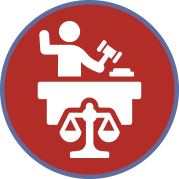7 Facts to Know About Guardianship
What is guardianship?
Guardianship is a legal word. Guardianship happens when a court decides that a person cannot make their own decisions. The court then gives someone else (a guardian) the power to make decisions for the person. This can happen to young people with intellectual or developmental disabilities (IDD). There are a lot of misunderstandings about what guardianship means for people with IDD and when it should be used. Many people with IDD do not need guardians. There are other options that they can use to get support to make decisions about their lives.What are alternatives to guardianship?
Alternatives to guardianship are tools that you can use to get support when you have to make tough decisions about your life. Alternatives to guardianship are tools that help you make your own choices. With alternatives to guardianship, you have control. A guardian does not make decisions for you.This information is for youth with intellectual or developmental disabilities, your parents, and your supporters.
Here are some of the top facts you should know about guardianship:
- FACT 1: Guardianship does not make you safe.
 People with IDD are not safer under guardianship. Having a guardian does not stop people from being hurt or abused. Having a guardian does not stop people from being arrested or getting in trouble. It is better for you to choose people you trust to help you learn how to make good choices. These people can help you build healthy relationships. They can also help you spot danger and help you learn what is safe. Research shows that people with IDD who are supported to have more control over their own lives are better able to avoid and resist abuse.
People with IDD are not safer under guardianship. Having a guardian does not stop people from being hurt or abused. Having a guardian does not stop people from being arrested or getting in trouble. It is better for you to choose people you trust to help you learn how to make good choices. These people can help you build healthy relationships. They can also help you spot danger and help you learn what is safe. Research shows that people with IDD who are supported to have more control over their own lives are better able to avoid and resist abuse.- FACT 2: Parents are not automatically your guardians when you become an adult.

In most states, the law says you are an adult when you turn 18 years old. To become your guardian when you are an adult, your parent or another person has to go to court and get a court order. A judge decides if you need a guardian. A judge also decides who the guardian is and what powers the guardian has.
- FACT 3: You may need help making decisions, but that does not mean you need a guardian.

We all need help making decisions sometimes! There are many alternatives to guardianship that you can use. Here are some examples of alternatives to guardianship. Click on these words to learn more about what they mean:
Guardianship is just one option. It is not always the best option, because it takes away your rights.
- FACT 4: After you become an adult, your parents can still get information about your health, school, and other things, if you want them to.

They do not need guardianship to get information about you. Do you want your family to still get information about your school or doctor? You can share this information with them yourself. You also can sign a “release of information” form. A release of information form gives schools, doctors, or service providers permission to share your private information with your family or other people you trust. In schools, this is called a “FERPA” form. In doctors’ offices, it is called a “HIPAA” form.
- FACT 5: After you become an adult, your parents can still go to your school meetings or doctor’s appointments, if you want them to.

They do not need to be your guardian to go to these meetings and appointments. You can invite anyone you want to go to meetings or doctor’s appointments with you. You can have your parents go with you. You can also have other support people go with you. It is your choice. Under federal special education law, parents should also still get special notices of your IEP meetings and anytime the school wants to change IEP services.
- FACT 6: It is hard to end or change guardianship.

If you or your guardian do not want guardianship anymore, it can be very hard to end it. It can cost a lot of money and take a lot of time. A judge gets to make this decision about ending or changing guardianship in court. Judges do not end very many guardianships. Once you have guardianship, it can be very difficult to change. That is why it is very important to think about alternatives to guardianship first.
- FACT 7: Guardianship takes away your rights.

Guardianship can make it harder for you to make important life decisions. Guardianship takes away all or most of your rights. You can lose your right to vote in some states. It can be hard to make your own choices and learn new skills if you have a guardian. People with guardians are less likely to make important life decisions, like:
- where to live
- who to live with
- their daily schedule
- what to buy with their spending money.
